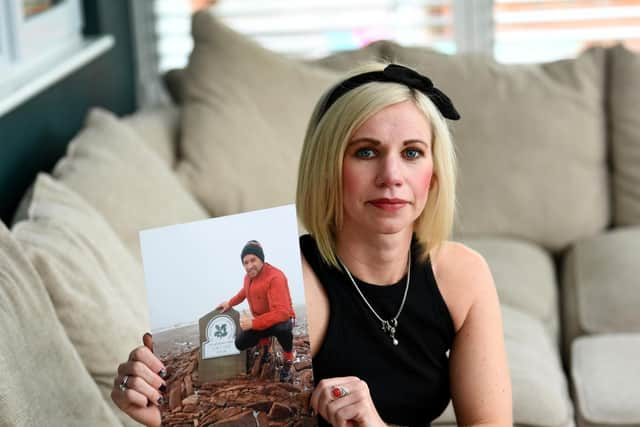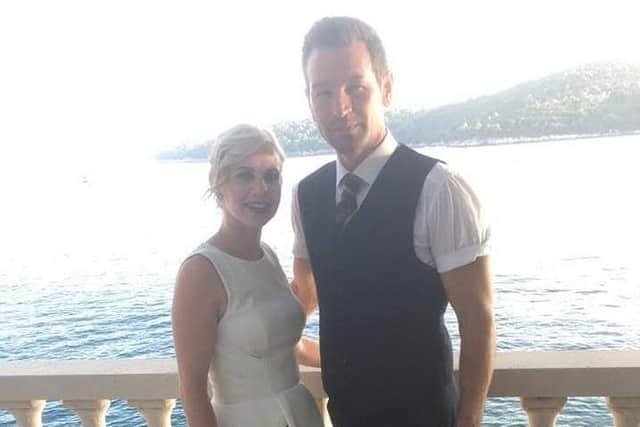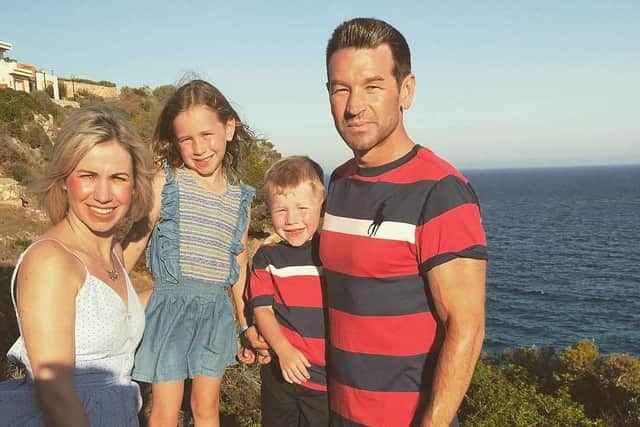Leeds United fan, 36, died after 'horrific' sequence of events
and live on Freeview channel 276
It followed a night out with work colleagues that he had enjoyed the previous day.
They had two young children, successful jobs - him as a Network Rail electrical engineer in Leeds and her as a nursery teacher at a primary school - and everything to live for.
Advertisement
Hide AdAdvertisement
Hide AdBy Monday morning, the 36-year-old Leeds United loving dad had died from meningitis, pneumonia and sepsis.


Recalling the “horrific” sequence of events from 2019, his widow Alison, is now trying to rebuild her life and is focusing on work she is undertaking with the National PNH Service in Leeds, one of only two specialist projects in the country to care for and support patients with Paroxysmal Nocturnal Haemoglobinuria (PNH).
It is a rare blood condition affecting less than 1000 people in this country, less than five people per million globally and is life-threatening.
There are only two centres for this in England with one based at St James’s University Hospital, Leeds and the other in King’s College Hospital, London.
Advertisement
Hide AdAdvertisement
Hide AdPNH means blood cells are attacked by part of the body’s immune system. There is still no proven reason why someone has it but it is linked to a gene change in one of the stem cells in the bone marrow and in turn, creating weaker than normal blood cells.


Craig discovered he had PNH at the age of 22 when receiving treatment following a car crash in 2005.
Back then there was no treatment but, after falling ill in 2013 with it shortly after daughter Elvy was born, he had been managing it with medication under the care of St James’s Hospital and then, in 2015, son Benjamin was born.
Mrs Longley, of Ackton, Featherstone said: “Everything seemed fine. It was the bank holiday weekend, he had been out, we had a family party on the Saturday. On Sunday morning, he had really bad backache. I said, as you do, ‘is it a hangover, have you got a cold’ as we had been outside and he was wearing a t-shirt and shorts.”
Advertisement
Hide AdAdvertisement
Hide AdThey went to Pinderfields A&E and were told it was muscular pain and sent home with codeine. His condition deteriorated throughout Sunday and in the early hours of Monday morning, he had tingling in his legs, they were cold and his lips were blue.


They returned to Pinderfields A&E, who in consultation with St James’, started treating him with antibiotics for meningitis.
But she was given heart-breaking news.
She said: “I didn’t know until after he died that the medication he was on made him more susceptible to meningitis.
“The doctor pulled me to one side and said they would have to put him to sleep to allow his body to fight it off but didn’t think he would wake up.”
Advertisement
Hide AdAdvertisement
Hide AdBy now he had pneumonia and sepsis and his organs had started to shut down.
“It just broke my heart. We had been together as a family on the Saturday, he was a bit poorly on Sunday, by the Monday I am getting told he is not going to survive. I was horrified - you don’t believe this is going to happen, you are still hoping it is not true.
“What do you say to your husband? You don’t want him to know he will never wake up. I just told him I was really grateful for everything that we have, I love you and I will see you soon. “Craig never knew that he was going to die.”
Craig’s parents arrived at Pinderfields just in time and by 7am on Monday doctors told them there was nothing more they could do and they would switch his life support off.
Advertisement
Hide AdAdvertisement
Hide AdMrs Longley said: “They turned the noise off, we sat around him just saying ‘come back’. But he didn’t.”
Craig was the first person to die of meningitis with PNH and now Mrs Longley wants to campaign to raise awareness of PNH and how it is communicated on medical records.
She said: “For me that was a massive deal, he had turned into a statistic. I don’t want that to happen to anyone else.
“He was really proud and didn’t tell some of his closest friends that he had it. For patients like him we need to be doing more to encourage them to. It was his responsibility to tell that doctor on the Sunday he had PNH but it should have been on his notes.”
Advertisement
Hide AdAdvertisement
Hide AdAs COVID restrictions are now lifted, Mrs Longley can step up her work with the National PNH Service and she is also preparing to walk the Three Peaks to raise money so that the service can continue its research.
Joined by her sisters and friends, as well as eight-year-old daughter Elvy, for one of the Peaks they will be putting best foot forward on October 16 - a date she picked because it was in the middle of Craig’s birthday on October 15, when he would have been 39, and her birthday on October 18.
Mrs Longley added: “I was not in the right frame of mind to do it, then COVID happened, but I said when he died I didn’t want it to happen to anybody else. I can’t not tell his story, he was an amazing person and had so much more he could have given in his life.”
Link to fundraiser - https://www.justgiving.com/crowdfunding/alisonlongley15